
|
Golconde, the Ashram’s impressive residential dormitory for sadhaks and guests, has become a familiar landmark to Pondicherry visitors. But when it was designed by Antonin Raymond and George Nakashima in 1935 and constructed between 1936 and 1942, it was a highly unusual undertaking in several ways.
|
View of Golconde from the south-east
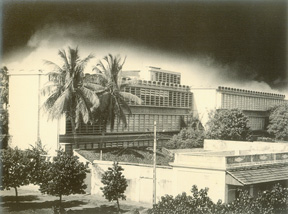 Click to enlarge
|
The new book introduced below, Golconde: The Introduction of Modernism in India, tells the remarkable story of this building through historical narrative, early and recent photographs, architectural plans, and extracts from letters, diaries, and books. Golconde was the first building in India to be constructed throughout in reinforced concrete; it incorporated modern aesthetics and technology in an innovative design that sought to mitigate the hot and humid climate of Pondicherry; and it was built by workers unskilled in modern construction techniques during a time when the outbreak of World War II made materials difficult to obtain. But these unique achievements in design and construction are the outward manifestations of the guiding inner spirit behind the project. From its very inception Sri Aurobindo and the Mother saw the greater possibilities of this work and the Mother remained involved in all the details of its progress. As Raymond recalls in his autobiography:
In an architectural journal he also wrote:
The book not only looks at the technical success of Golconde as an example of early architectural modernism but evokes also the spiritual meaning behind the building. Sri Aurobindo once remarked that the Mother worked out her own ideas through the architects, using the construction of Golconde to demonstrate her belief that beauty is a part of spiritual life; that physical things have the Divine Consciousness at their base as much as living things; and that being so, they have their own consciousness and individuality, should be handled properly, and always used in the right way. This book presents an updated look at Golconde, whose architecture exemplifies a conscious harmony with its surroundings, embodying beauty and graceful living, and provides an outer environment that reflects and supports the inner life of its residents.
|
|
Interior corridor
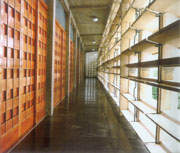 Click to enlarge
| South garden
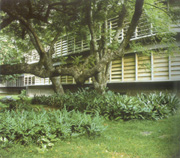 Click to enlarge
|
|
Raymond arranged for the planting of the south and north gardens of Golconde to increase the cool currents of air in summer. The south garden was planted with many trees and shrubs, whereas the north garden was very sparsely landscaped. The hot air over the north side rises up and draws in the air from the cooler and shaded south side through the open concrete louvers.
|
The other new book introduced below is a historical novel based on the life of Sri Aurobindo. The title Uttara Yogi refers to the prophecy made in 1870 by the spiritual leader of the Nagai Japata that after three decades a great yogi from the North would come as a fugitive to the South to practice there a purna yoga, and that his arrival would be a sign that the country would become free from foreign rule. The book focuses on the rise of the nationalist movement in Indian politics and Sri Aurobindo’s role as one of its most important leaders. Dramatic tension builds through the tales of adventure and patriotism that involve the revolutionaries, including a detailed and suspenseful account of the Alipore Bomb Trial. As fictional and historical characters meet amidst the action of the unfolding story, echoes of the prophecy by the Nagai Swami continually surface. This passage from the final pages of the book depicts the arrival of Sri Aurobindo in Pondicherry on 4 April 1910, one hundred years ago this month:
|
|
NEW PUBLICATIONS
To order any book, click on the title, which will locate the book in our online catalogue. Next, add it to the shopping cart. You may then proceed to pay by credit card online.
ENGLISH |
 | Golconde: The Introduction of Modernism in India
— Pankaj Vir Gupta, Christine Mueller, Cyrus Samii
ISBN: 978-0-9795534-4-8
Publisher: Urban Crayon Press, USA
Binding: Soft Cover
Pages: 98
Price: Rs 1600
| Using a combination of historical narrative, early and recent photographs, architectural plans, and extracts from letters and diaries of those involved in the work, this book gives a history of the design and construction of Golconde, a dormitory for residents of the Sri Aurobindo Ashram, and the first structure in India to use reinforced concrete throughout. The authors, a team of three contemporary architects, lay emphasis on its technologically innovative design, the precise craftsmanship in every detail, and the spirit of modernism with which the original architects conceived and carried out their design while addressing the harshness of the local climate, the scarcity of building materials, and a labour force untrained in modern construction methods.
|
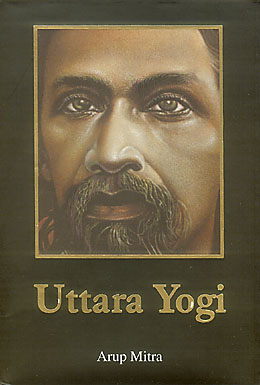 | Uttara Yogi
— Arup Mitra
ISBN: 978-81-89738-55-6
Publisher: Niyogi Books, New Delhi
Binding: Hard Cover
Pages: 576
Price: Rs 495
| This historical novel takes place in pre-independent India, at a time when efforts were being organised to throw off British rule. Through the narrative of the fictional character Harimohan Datta, who meets and befriends Sri Aurobindo, the author recounts the story of Sri Aurobindo’s life and his rise to prominence as a leader of the nationalist movement. Interwoven with the well-known events and historical personalities of the day are varied characters who become involved in the adventures, betrayals, and tales of patriotism that move the story to its conclusion, the arrival of Sri Aurobindo in Pondicherry on 4 April 1910.
|
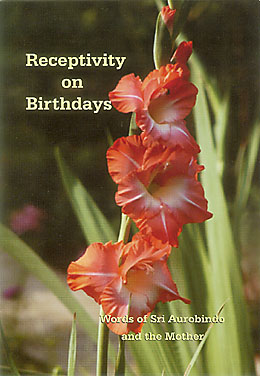 | Receptivity on Birthdays
— Words of Sri Aurobindo and the Mother
ISBN: 978-81-7060-290-3
Publisher: Sri Aurobindo Society, Pondicherry
Binding: Soft Cover
Pages: 32
Price: Rs 30
|
|
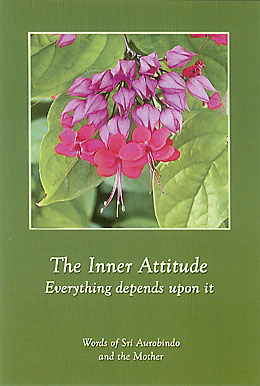 | The Inner Attitude
Everything depends upon it
— Words of Sri Aurobindo and the Mother
ISBN: 978-81-7060-288-0
Publisher: Sri Aurobindo Society, Pondicherry
Binding: Soft Cover
Pages: 32
Price: Rs 30
|
|
HINDI |
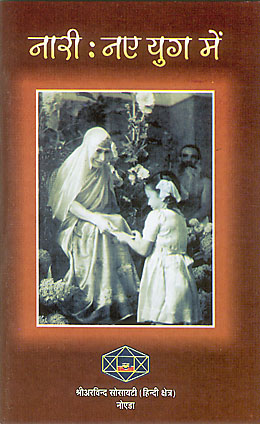 | Nari: Naye Yug Main
Srima-Sri Aravinda ke Alok main
— Sri Mataji aur Sri Aravind ke Lekhon, tatha anya sthanon se sankalit
Publisher: Sri Aurobindo Society, Zonal Committee (Hindi) Noida
Binding: Soft Cover
Pages: 88
Price: Rs 35
|
|
BENGALI |
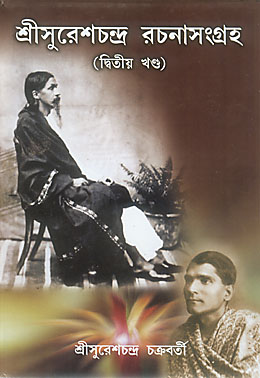 | Sri Suresh Chandra Rachana Sangraha – Part 2
— Suresh Chandra Chakravarty
Publisher: Dipak Kumar Gupta, Pondicherry
Binding: Hard Cover
Pages: 444
Price: Rs 150
|
|
GUJARATI |
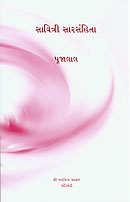 | Savitri Sarsamhita
— Pujalal
ISBN: 978-81-7058-881-8
Publisher: Sri Aurobindo Ashram Publication Department, Pondicherry
Binding: Soft Cover
Pages: 285
Price: Rs 160
| Available again after a long time
|
TELUGU |
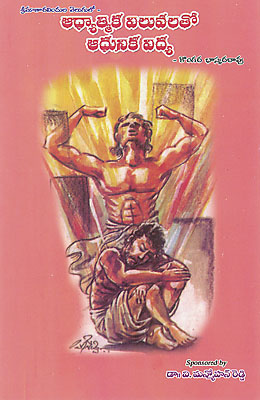 | Adhyatmika Viluvalato Adhunika Vidya
— K. Bhaskara Rao
Publisher: Sri Aurobindo Society, Tenali
Binding: Soft Cover
Pages: 52
Price: Rs 50
|
|
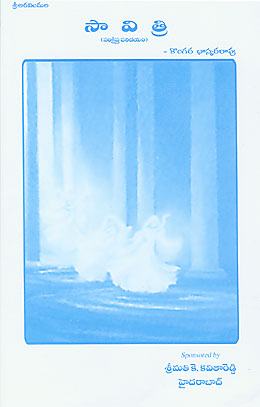 | Savitri (Sankshipta Parichayamu)
— K. Bhaskara Rao
Publisher: Sri Aurobindo Society, Tenali
Binding: Soft Cover
Pages: 56
Price: Rs 50
|
|
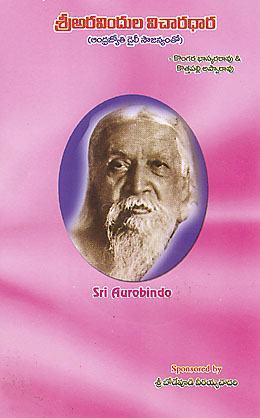 | Sri Aravindula Vichara Dhara
— K. Bhaskara Rao and K. Appa Rao
Publisher: Sri Aurobindo Society, Tenali
Binding: Soft Cover
Pages: 61
Price: Rs 40
|
|
RUSSIAN |
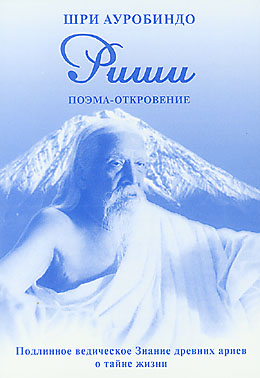 | Rishi
— Sri Aurobindo, perevod i kommentarii Dmitriya Melgunova
ISBN: 978-5-91258-115-1
Publisher: Fund for the Integral Human Development "Savitri", Russia
Binding: Soft Cover
Pages: 95
Price: Rs 130
| The Rishi is one of the most powerful poetical works of Sri Aurobindo. Composed in the form of a dialogue between the legendary Aryan king Manu and the Rishi of the Northern Pole, this revelatory poem gives a comprehensive view of ancient Vedic knowledge and the true Aryan spirituality, integral in its vision of both transcending life and embracing it. The book is bilingual, with extensive commentaries by the translator, including many quotations from other works of Sri Aurobindo.
|
|
|